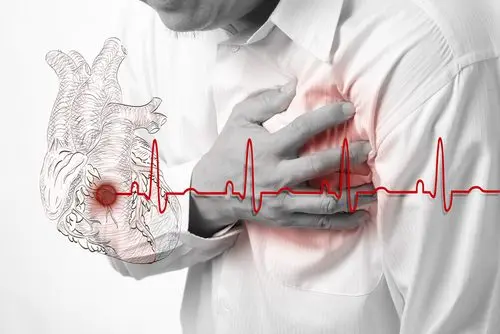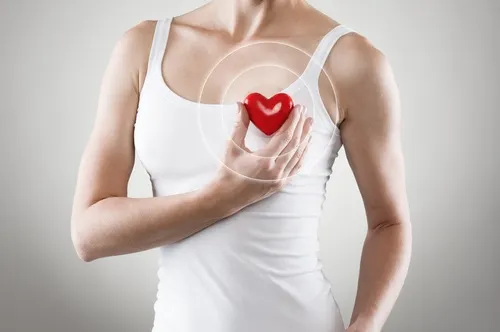Can Coughing Stop a Heart Attack?


Reviewed and approved by the doctor Maricela Jiménez López
For years, the claim has been spread that coughing forcefully helps to stop a heart attack, mostly because the vast majority of people want to find a way to avoid consequences that may affect their quality of life in the long run.
There are several warning signs that something is wrong and that a heart attack may be occurring; there’s chest pain, the chest starts beating irregularly, and suddenly, there’s a sensation of great weakness and the person feels as if he/she is on the verge of fainting.
Faced with these symptoms, people usually rush to seek medical help, but what can be done in the meantime? And how can it be done even when panic begins to take control of the situation.
The effectiveness of coughing for a heart attack
The first fact is that this practice is often confused with a kind of cardiopulmonary resuscitation (CPR), due to the name it receives in English (cough CPR). By definition, this technique is used on patients who are not breathing or have no pulse, something completely different from a heart attack or heart attack. Patients with this condition do have cardiac and pulmonary activity, despite being at risk for an attack.
To date, there’s no evidence to indicate that coughing can improve the evolution of a heart attack. It’s possible that a myth has been created as a consequence that inducing coughing in certain circumstances of cardiovascular danger could be beneficial for patients, but not in the midst of a heart attack.
Let’s take a look at an example. A study published in Catheterization and Cardiovascular Diagnosis indicated that cough induction in the hemodynamics laboratory in patients with malignant ventricular arrhythmias could favor the procedure. Indicators such as blood pressure and state of consciousness (which speaks of adequate cerebral perfusion) were better maintained in those who coughed about 30-60 times per minute.
However, this is evidence under very specific and very particular conditions. Although it has even been considered a first aid technique, to date there is still no conclusive evidence to allow the scientific community to affirm that it is indeed a first aid technique.
Like this article? You may also like to read: Exercise and Heart Disease: What Should You Take Into Account?
Heart attacks and cardiac arrest
There is a tendency to confuse these two concepts. The reality is that one is not the same as the other. However, it’s true that both situations can have very similar causes (usually related to problems with blood circulation and blood supply to the heart).
Cardiac arrest

Cardiac arrest occurs when the flow of blood circulation in the body decreases . What happens in this case is that the contractions of the heart become weaker and more irregular.
Thus, the different parts of our body begin to receive an insufficient supply of oxygen. Because of this decrease in the amount of oxygen, the person will lose consciousness.
Heart attack
A heart attack, medically known as a myocardial infarction, occurs when the blood flow is cut off at a particular point in the heart, usually as a result of blocked arteries. This, in turn, causes the cells at that point to die.
If timely treatment is not provided, over time, these changes in the blood and oxygen supply to the heart will cause severe damage to the heart muscle and other tissues.
Symptoms associated with a heart attack that we must recognize in order to act quickly include the following:
- Fatigue
- Dizziness
- Nausea
- shortness of breath
- Chest pain
- Hyperhidrosis (excessive sweating).
First aid in the case of a heart attack
- No matter what, go to the emergency room or call for home medical help if chest pain does not go away within three minutes.
- It does not matter what you are doing. If you are driving, stop the vehicle quickly and call the emergency services. It is important to avoid driving yourself as much as possible, since you can lose consciousness at any moment: while driving, and this would have fatal consequences (not only for the person having a heart attack, but also for pedestrians on the road, other vehicles, etc.).
- Remain still so that the exhausted heart muscle is not overworked.
- Loosen any tight clothing.
- Striking the chest area hard may also help to stop a heart attack.
- If this is the first time you’re having had a heart attack, taking an aspirin tablet is a good help to improve blood flow.
- If you’re already receiving medical treatment, there will likely be some type of beta-blocker medication that can help stop and control the heart attack.
- If you’re with someone who is having a heart attack, is unconscious, not breathing and has no pulse, you should start CPR if you know the technique. Otherwise, call the local emergency service and they will tell you how to do it.
We think you may also enjoy reading this article: Can Heartbreak Damage Your Health and Well-Being?
Tips to take care of your heart

- Physical exercise is essential for good heart health. You can exercise in the gym, or go for a walk a day in the morning or in the afternoon.
- Raw garlic contains a substance called allicin, which is very positive for heart health.
- Sleep well. It’s important to have a good sleep habit and get adequate rest.
- B vitamins can widen the blood vessels, and get the blood circulation flowing.
- A full sex life helps to keep the heart healthy.
- Your blood pressure should be checked regularly. It should be kept stable to prevent a sudden heart attack.
- Smoking and alcoholism should be avoided in order to have good cardiovascular health. If you’re a smoker, you should quit as soon as possible.
As you can see, coughing isn’t an effective method to stop a heart attack. However, timely identification of the symptoms will allow you to take appropriate measures to avoid suffering irreversible damage. In addition, practicing healthy habits will promote cardiovascular health and prevent conditions that affect this important organ.
All cited sources were thoroughly reviewed by our team to ensure their quality, reliability, currency, and validity. The bibliography of this article was considered reliable and of academic or scientific accuracy.
- ”El bulo sobre la utilidad de toser durante un ataque al corazón”. 2017. El País – Verne: Bulos. [En línea] Disponible en: https://verne.elpais.com/verne/2017/01/26/articulo/1485441077_041440.html.
- Deepak L. Bhatt, M.D., M.P.H. (2018). Does “cough CPR” work? Harvard Health Publishing. [Online] Avaiable at: https://www.health.harvard.edu/heart-health/does-cough-cpr-work.
- Alle, Christopher. Could something called ‘cough CPR’ save my life? Heart Matters Magazine. British Heart Foundation. [Online] Avaiable at: https://www.bhf.org.uk/informationsupport/heart-matters-magazine/medical/ask-the-experts/cough-cpr.
This text is provided for informational purposes only and does not replace consultation with a professional. If in doubt, consult your specialist.








